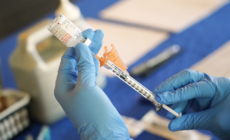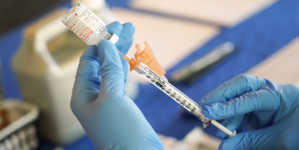-
How a Duct-Taped Banana Sold for $6.2 Million - 12 mins ago
-
Map Shows US States With Highest Levels Of Long COVID - 20 mins ago
-
Patriots Owner Robert Kraft Once Again Denied Induction into Hall of Fame - 55 mins ago
-
The Alluring Dream That Black America Needs to Wake Up From - 56 mins ago
-
Brooke Shields’ 2-Word Nickname for George H. W. Bush - 2 hours ago
-
The Secret Behind America’s Moral Panic - 2 hours ago
-
Ex-Congressman on Bondi Pick: Bag of Peanut Butter Is ‘Better Than Gaetz’ - 2 hours ago
-
Chuck Scarborough to Step Down as WNBC News Anchor After 50-Year Career - 2 hours ago
-
‘Wordle’ Today #1,252 Answer, Hints and Clues for Friday, November 22 - 3 hours ago
-
The UK Faces a Dilemma: Cozy Up to Trump or Reconnect With Europe? - 3 hours ago
South Korea Announces New Family Plans Amid Plummeting Birth Rate
South Korea announced a raft of new measures aimed at making life easier for parents to counter the nation’s birth rate freefall, which President Yoon Suk Yeol has dubbed a “national emergency.”
The country’s fertility rate, already the world’s lowest, dropped further last year, with the average number of expected babies per woman decreasing to 0.72 from 0.78 in 2022—significantly below the replacement rate of 2.1. Work conditions not conducive to raising children, along with the high cost of urban living, is often cited as a factor driving the trend.
Despite significant investment—over $200 billion in 16 years—into policies, including cash incentives, fertility treatment subsidies, and childcare services, South Korea’s birth rate remains critically low. Officials hope these latest efforts will have a greater impact.
The Presidential Committee on Ageing Society and Population Policy outlined new and in-the-works initiatives in its report on Wednesday.

Afton Almaraz/Getty Images
The report noted the country’s parliament had recently passed legislation to extend parental and spousal maternity leave while offering more support so employees with young children can reduce their work hours to care for them.
Additionally, work is ongoing to raise the ceiling for parental leave payments and streamline applications for combined maternity and paternity leave.
Prenatal and stillbirth leave are also being expanded. During the first trimester, the current leave period for either category will be doubled from five to 10 days. Husbands of women who have experienced stillbirths will receive three days of paid leave to help ease their recovery, and their employers will receive government subsidies to offset workforce absences.
Other measures include efforts to enhance access to and the quality of postpartum care centers.
For infertile couples, the government will update policies so that if fertility procedures fail, financial support won’t be clawed back.
The government will also provide tax relief to small and medium-sized enterprises with “excellent work-family balance” policies. Companies in this category that have been picked for regular tax audits will be eligible for deferrals of up to two years.
Parental leave is becoming more flexible, too. Instead of requiring parents to take two consecutive weeks, they can now opt to split their leave into one-week increments, offering more adaptability for both families and employers.
Newsweek has reached out to the South Korean embassy in Washington, D.C., for comment.
Wednesday’s announcement comes as Seoul steps up efforts to centralize and strengthen its campaign to boost births.
The government is launching a new ministry dedicated to population strategy, aimed at addressing productivity concerns in Asia’s fourth-largest economy.
A Ministry of Gender Equality and Family survey published in May revealed that only 38.5 percent of 13-24-year-olds believe marriage is necessary, down 12.5 points since 2017. Additionally, 60 percent of respondents said it isn’t necessary to have children if they do marry.
Amid shifting generational attitudes and the obstacles that come with starting families, many younger South Koreans are prioritizing lifestyle choices instead.
A recent Hyundai Card report highlighted that shoppers in their 20s and 30s have significantly increased their spending at department stores, while overall savings rates have fallen. The country’s central bank noted that Koreans in their 30s saved just 28.5 percent of their income in early 2024, down from 29.4 percent in 2019.
Still, South Korea recorded a small increase in births for two consecutive months, with 20,098 babies born in August—a 5.9 percent increase from the previous year.
However, this bump was attributed at least in part to delayed marriages during the COVID-19 pandemic.
Source link




















